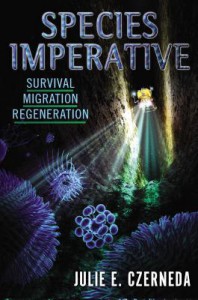Decent but not great SF; tedious romance

Julie Czerneda is not an author whom I follow regularly. But she has been on my radar ever since reading A Thousand Words for Stranger several many years ago. I read Survival, the first book in the Species Imperative series, when it came out and enjoyed it well enough. By the time Migration, book two, came along, I was reading other things and never found the time or inclination to continue. Recently, DAW issued the entire series in this omnibus volume, offered by the Science Fiction Book Club, and – the stars being favorable – I decided to complete my reading.
A brief summary: Sometime in the future, Earth has become a member of the Interspecies Union, a galaxy-wide association of aliens held together by the Sinzi, who control the transect technology that makes FTL travel possible. While interspecies relations are never easy, the situation appears stable and there are no threats on the horizon. In the Solar system, heavy industries and much of the population have moved off Earth, allowing the planet to begin recovering from the ravages of the Industrial Age.
Things are never so simple, of course; otherwise we wouldn’t have a novel. Along one of the transects that pass through the Solar system, there is a region of space called the Chasm, where every potentially life-bearing world has been scoured of all organic life. No current space-faring species knows who, why or how this occurred but recently similar scourings have been happening on worlds along the transect.
All this is of little concern to our heroine Mackenzie Connor (Mac), a marine biologist whose primary (read – sole) focus is “salmon.” She’s co-administrator of a research station on the northwest Pacific coast of North America and has neither plans nor desire to be anything else.
Her “perfect world” is rudely interrupted by the arrival of Brymn, a Dhryn archaeologist, who insists that her knowledge of migration patterns is crucial to solving the mystery of the Chasm and the survival his race. Mac is furious at this intrusion and dubious about her importance in the matter but before these questions can be explored, the research station is attacked and Mac’s closest friend, Emily Mamani, is kidnapped by a xenophobic species called the Ro. An enemy so terrifying to the Dhryn that they become catatonic when in their presence.
Survival ends with some startling revelations about the Dhryn and their relationship to the Ro, as well as equally startling discoveries about Emily and her actual relationship to these enigmatic enemies. Migration continues the story, with Mac focusing on getting Emily back from the Ro. And Regeneration completes the arc with a final confrontation with the xenophobes and redemption for the Dhryn.
As other reviewers have mentioned, there’s a lot of filler. Some of the side trips are useful. Such as the aside when Mac visits her family’s cabin and meets Kay (a Trisulian) and Fourteen (a Myg), two aliens whose presence then and later prove essential to the story. Other subplots are less so. The weakest is the romance between Mac and Nikolai Trojanowski (Nik), a covert agent of Earthgov and sometimes the IU. It’s such a staid, by-the-numbers, boring relationship that it brings everything to a shuddering halt whenever the reader has to slog through the couple’s all-too-cute repartee. You could excise the entire romantic subplot and lose nothing in the story-telling. If Czerneda really had to include a romance, I wish she would have pursued one between Mac and Emily. That’s a relationship that could have had energy, and would have been more interesting than what we got.
Clichéd romance aside, when Czerneda focuses on her story – the existential threat to the IU and Mac’s role in resolving it – the pacing is good, the plot interesting, and it mostly makes up for the novel’s weaknesses. I think the author does a particularly good job of conveying the “alienness” of her aliens. She can’t always fully develop these traits but she does well with making the Dhryn and Sinzi, for example, not just humans with forehead prostheses. On the other hand, the Ro are one-dimensional, moustache-twirling villains who should have been more nuanced, like the Dhryn or the Trisulians (who tend to act like sociopathic scavengers from a human perspective but are still convincingly portrayed by Czerneda).
I’m on the fence as to recommending these books. If you’re already familiar with Czerneda’s work, and like it, you’ll like these books. If not, she’s not a good enough author (IMO) to get enthusiastic about.
 3
3


